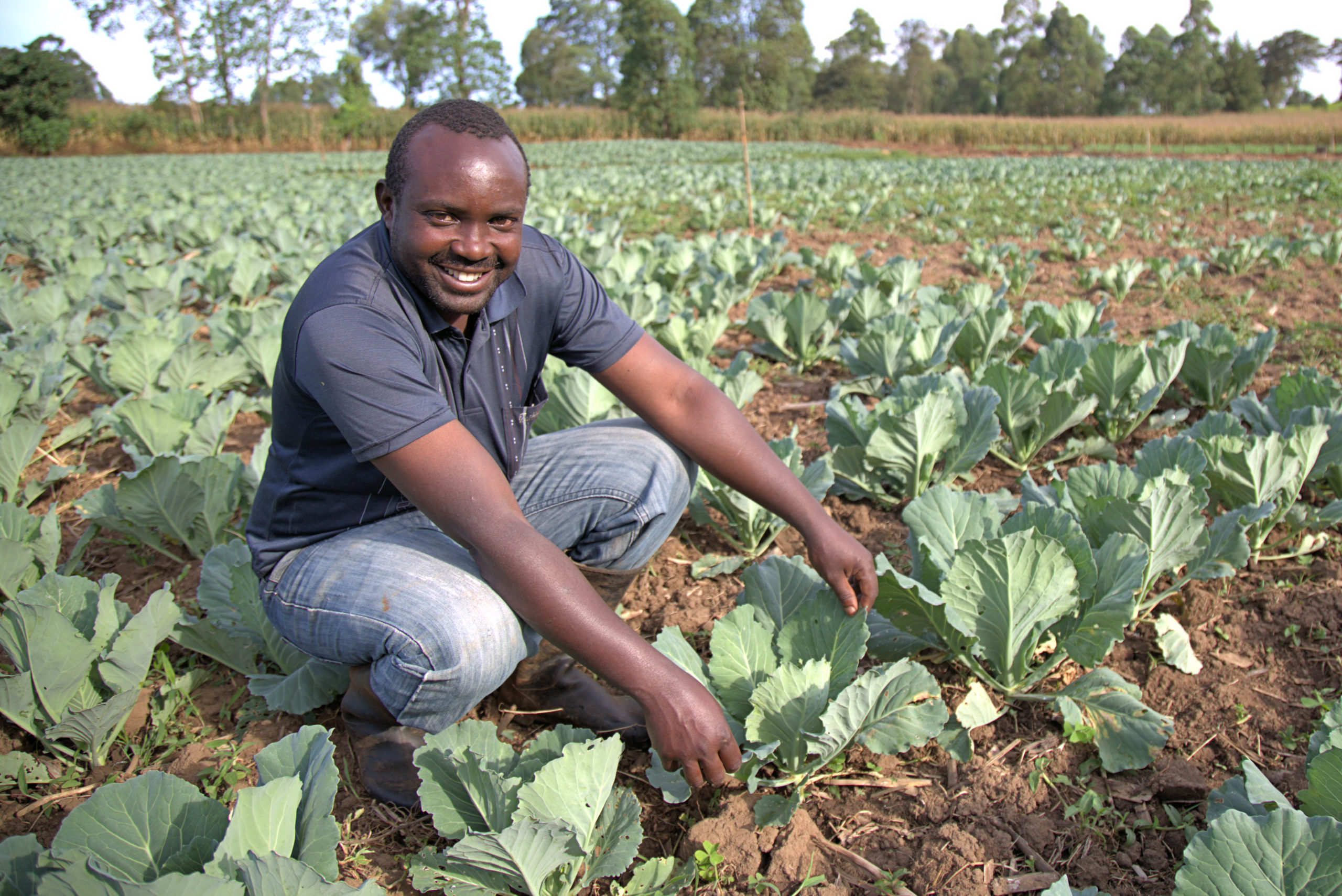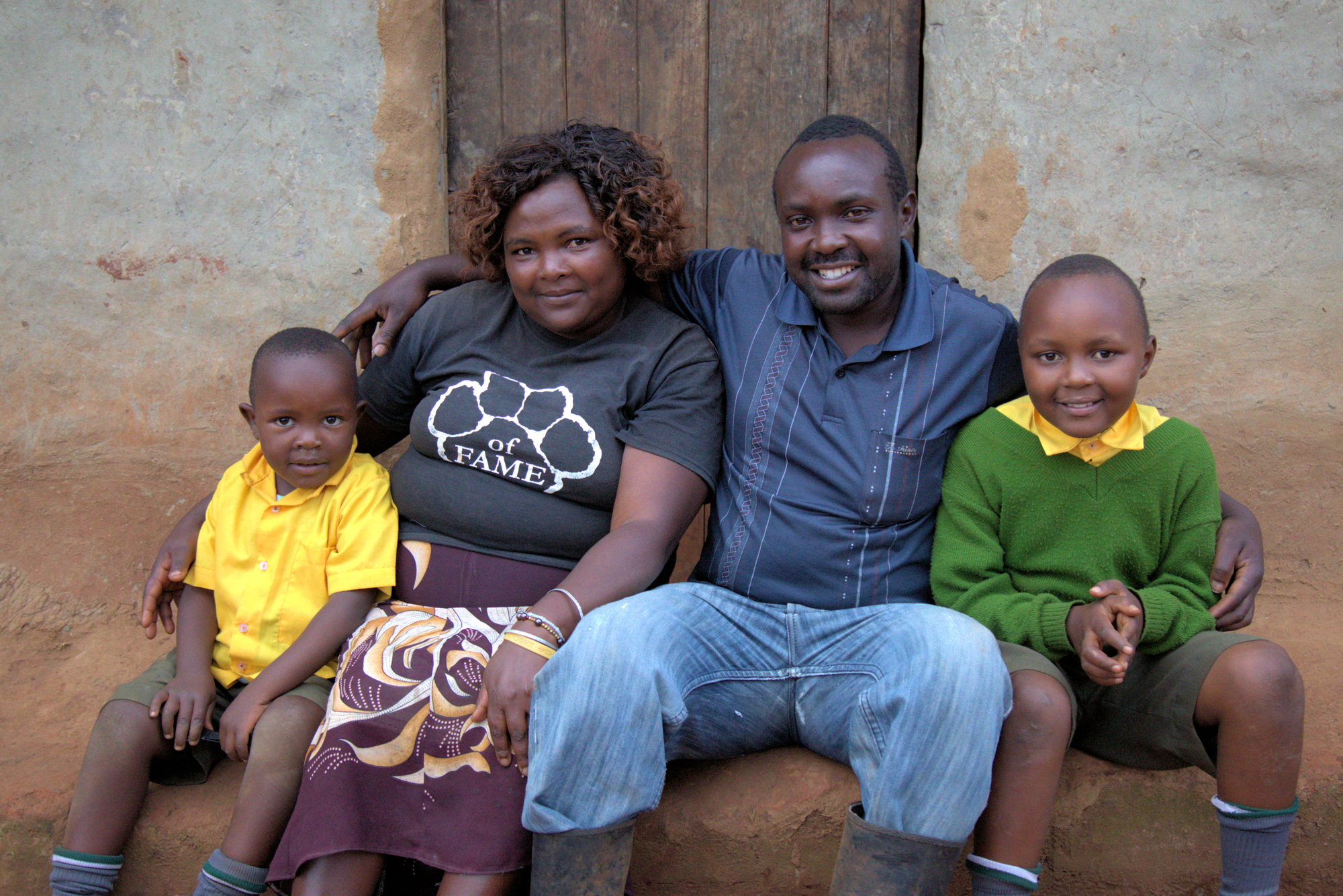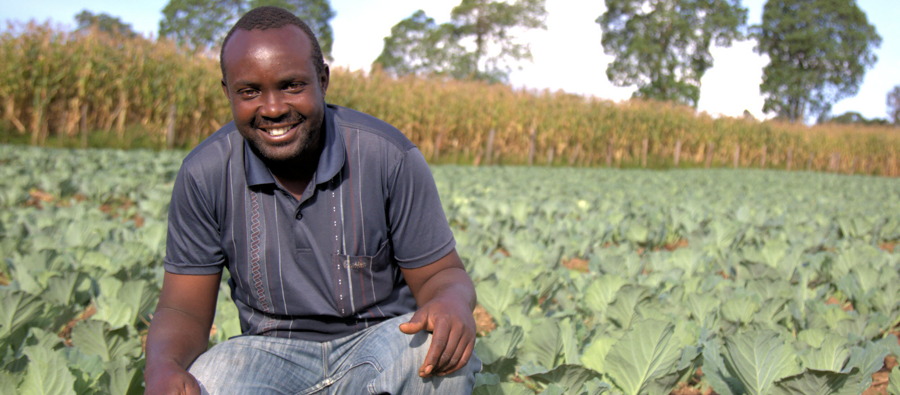Partnerships between public and private sectors offer diverse ways to boost productivity and incomes, helping smallholders escape the trap of low yield, low investment, low income. Farm Africa is working with supermarket Aldi to help Kenyan farmers end hunger with better results.
Joseph Kaunda, a young father of two from Kitale in western Kenya, is no stranger to the challenges of trying to earn a decent living from farming. Faced with pests and diseases, yet unable to access pesticides, he used to struggle to bring in a good harvest. And even when he did, lack of links to markets meant the crops would sometimes rot before he found a buyer, and with them went his chances of making a profit.
“When the market is not available, sometimes things go rotten on the farm,” he said. “When things rot, I get very discouraged. You spend a lot of money buying seedlings and tilling the farm. When you do not do well, it takes a while to get the capital to start again.”
Stuck in a cycle of low-input, low-output, low-profit agriculture, it’s easy to see why many young people in Kenya are discouraged about farming.
With limited access to land and transport, the odds are stacked against young farmers’ chances of success. And with few assets to offer as collateral, young people rarely qualify for finance to invest in equipment or high-quality inputs.
Yet young people make up a huge proportion of Kenya’s population, with 80% of people under the age of 35. The country’s prospects for improving food security and nutrition and tackling youth employment depend on empowering young people to make a success out of farming.
Joseph’s farming business has turned a corner since he started taking part in the Growing Futures project run by Farm Africa, a charity that tackles poverty in eastern Africa by helping farmers grow more, sell more and sell for more.

Joseph with his cabbages in Kitale, Kenya (Farm Africa/Tara Carey)
The project, which is funded by Aldi UK, is an example of how private-public collaborations can contribute towards achieving SDG 2.3 and boost smallholder farmers’ productivity and incomes. Key to the project’s approach is not just developing agricultural expertise, but crucially also by building farmers’ links to profitable markets.
During the last 12 months, the project has established 21 demonstration plots, where young farmers have learnt practical skills for growing mangetouts, French beans, cabbages, kale and chilli peppers.
Almost 400 young farmers, from Kitale in western Kenya, are now benefiting from the fundamental agricultural skills and practices learnt including: crop rotation, irrigation, planting, harvesting and pest management. Thanks to the partnership between Aldi and Farm Africa, they are on the road to sustainable business.
The first harvests this year have seen bumper yields, with 96,500kg of cabbages and 37,200kg of French beans grown by the first group of 118 farmers to have completed a growing cycle so far.
The young farmers have also undergone thorough training in financial management and writing business plans, giving them the springboard they need to establish and run a profitable agricultural business. The first vegetables to have been sold achieved impressive profit margins of 62 per cent for cabbages and 50 per cent for French beans. And new buying contracts mean the farmers can enjoy the security of a more reliable income in the future.
Commenting on how he had benefited from the project, Joseph said: “Before, it was hard for me to know that I was growing the right product on my farm, which would have a good market. Most of the other people around here grow maize, but when locals found out that cabbages were good, many people started to grow them.

Joseph, wife Milcah, & sons Charles, 4, Dalton, 9 (Farm Africa/Tara Carey)
“Now we have become known as an area that produces cabbages so the traders come, it is good because we now have a ready market. I have seen a 65 per cent increase in the volume we are producing and the profit.
“I have always been a vegetable farmer growing tomatoes, cabbages and kale. The Growing Futures project trained me on how to improve productivity and now I am able to grow different grades of vegetables – for example, for those buyers who need smaller heads of cabbage, I am able to produce by reducing the spacing and for those who want large heads, a larger spacing allows the cabbages to expand more.”
Over the next two years, the young farmers will receive further training and support in finding the right buyers, business development skills, post-harvest handling and good warehouse practices.
Mary Dunn, a spokesperson for Aldi UK, said: “By collaborating with Farm Africa we’ve had a tangible and positive impact on people’s lives, and are helping young people to escape the cycle of poverty. Learning these new skills is truly making a difference in these communities.”
The project is also helping the farmers to gain Global GAP certification, which they need in order to be able to export their vegetables, a more lucrative option than the domestic market, and a crucial step in helping boost the farmers’ incomes.
Visit www.farmingfirst.org/SDGs for quizzes, videos, infographics & more on SDG 2.3. Share your stories on doubling productivity & incomes using #Ag4SDGs and join the campaign!



